Install the app
How to install the app on iOS
Follow along with the video below to see how to install our site as a web app on your home screen.

Note: this_feature_currently_requires_accessing_site_using_safari
You are using an out of date browser. It may not display this or other websites correctly.
You should upgrade or use an alternative browser.
You should upgrade or use an alternative browser.
Ebooks and Audiobooks Collection
OP
Member
LEVEL 5
70 XP
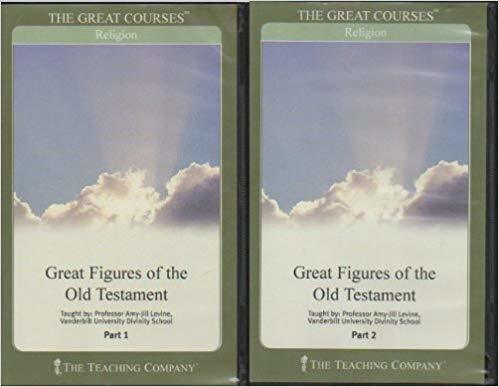
Great Figures of the Old Testament [TTC Audio]
English | 2002 | 12 hrs and 10 mins | MP3 | 167 MB
Improve your biblical literacy with these 24 insightful lectures about the cast of vivid characters in the New Testament. From the well-known figures of Jesus, John the Baptist, and the disciples to important but lesser known figures, such as the Syro-Phoenician woman who must turn Jesus's own words back on him to gain the healing of her daughter, Professor Levine paints vivid portraits of Christianity's founding generation. You'll learn about such figures as: The elderly couple Elizabeth and Zechariah and their son, John the Baptist; Jesus's friends, the contemplative Mary and the vocal Martha, as well as their brother, Lazarus; The apostles Peter and Thomas, James and John, and Judas Iscariot; Mary Magdalene, who becomes known as the apostle to the apostles; Paul the apostle, as presented in Acts of the Apostles and what can be determined about him from his letters; A number of strong and interesting women, including the unnamed Samaritan and a repentant sinner who anoints Jesus; Jesus's interlocutors, including the centurion with a paralyzed son and the desperate Canaanite mother with a demon-possessed daughter. Rather than promoting any particular religious worldview, this course seeks to read the ancient texts anew to discover what they really say and how they were interpreted by both the secular culture and the faithful church.
Great Figures of the Old Testament - Amy-Jill Levine
01 The Old Testament
02 Adam and Eve
03 Cain and Abel
04 Noah
05 Abraham
06 Sarah and Hagar
07 Jacob
08 Joseph
09 Moses
10 Joshua and Rahab
11 Deborah
12 Sampson
13 Samuel and Saul
14 David
15 Solomon
16 Elijah
17 Job
18 Jonah
19 Ruth
20 Esther
21 Daniel
22 Judith
23 Angels
24 God
Code:
https://nitroflare.com/view/B9251600026F80F/Great_Figures_of_the_Old_Testament_-_Amy-Jill_Levine.rar
Code:
https://rapidgator.net/file/81eff98f75271f5fa2cae935067ebbb4/Great_Figures_of_the_Old_Testament_-_Amy-Jill_Levine.rar.html
OP
Member
LEVEL 5
70 XP
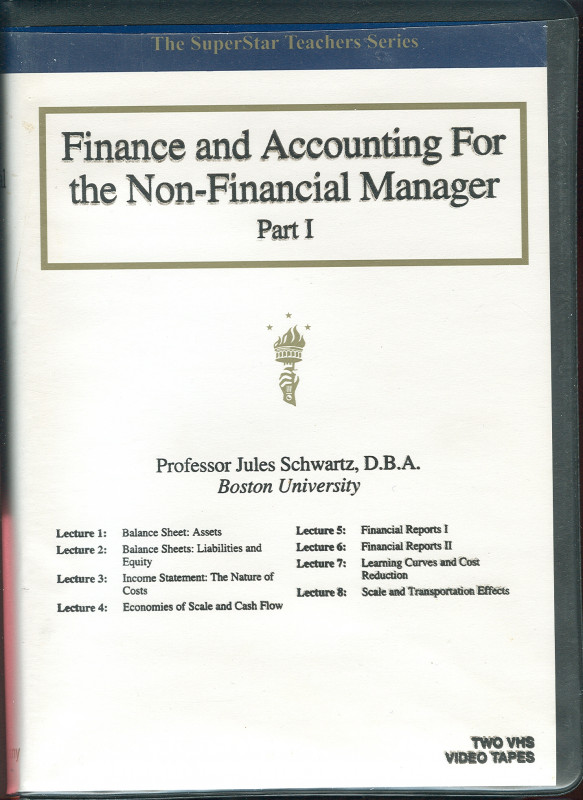
Finance and Accounting for the Non-Financial Manager [TTC Audio]
English | 1996 | 11 hrs and 49 mins | MP3 | 317 MB
Finance and Accounting for the Non-Financial Manager
(16 lectures, 45 minutes/lecture)
Course No. 533
Taught by Jules Schwartz
Retired, Boston University
Ph.D., Harvard University
In 1494, a Franciscan monk and professor of sacred theology in Venice wrote the first textbook of modern accounting.
Five centuries later, businesspeople the world over, American or Italian, Japanese or Nigerian, still speak the fundamental language of business created by Luca Pacioli.
Investors, business owners, and managers have always had a deep need to become fluent in the lexicon of accounting and finance.
Understanding the Language of Profit Is Now Essential
But as firms catch the wave of open-book and profit-share management, everyone who works at these firms now needs to become proficient in the language of profit.
If you are in any of these groups, there are key concepts you need to understand, including:
income statements
balance sheets
cash flow analysis
net present value
debt-to-equity ratios
the vast differences between profits and cash
the host of financial measurements that constitute the bottom line.
Accessible, Useful, and Fun to Learn
This course is designed to teach you those concepts in a way that is accessible, immediately useful, interesting, and in the hands of teacher Jules Schwartz even fun.
Professor Schwartz's varied and successful background in business, investment banking, and academics includes being the recipient of Boston University's Metcalf Prize for distinguished teaching, making him an ideal choice to teach this course.
His lectures are illustrated with computer-generated graphics to display financial statements, definitions, formulas, and equations.
One concept at a time, he clearly explains many of the crucial aspects of the world of business and how they are connected to one another, ranging from the balance sheet to debentures, from the learning curve to the Lang effect.
And to ensure that you master each type of business problem covered in the lectures, the outline booklet that accompanies the course includes example problems and their solutions.
Lecture by lecture, you gain fluency in the language of accounting.
And you also add a vital dimension to your understanding as you learn to see how the numbers from a financial statement impact a firm's strategy, growth, and sources of revenue to pay for its activities.
Lecture 1: Balance Sheet: Assets
This first lecture introduces the balance sheet, or statement of a company's condition.
Professor Schwartz explains this "snapshot" of a company's assets and offers an explanation of where funds come from to buy these assets.
Lecture 2: Balance Sheet: Liabilities and Equity
This lecture discusses the sources of investment funds open to a company. You learn the advantages and disadvantages of debt and equity financing.
Lecture 3: Income Statement: The Nature of Costs
This lecture explores the income statement, a report on the profit results for the accounting period. You examine how the nature of cost influences both results and financial decisions.
Lecture 4: Economies of Scale and Cash Flow
You learn how to approach what is an important goal for every business: maximizing the amount of cash it generates relative to the amount it has invested.
Lecture 5: Financial Reports I
In a two-lecture lesson on financial reports, you get a chance to examine a real report in detail as Professor Schwartz unveils the 1972 Annual Report of the United States Steel Company.
As you go through the numbers, you gain an understanding of both the level of precision you can expect in such information and the degree of discretion management exercises in presenting information to its shareholders.
Lecture 6: Financial Reports II
This lecture continues the examination of the U.S. Steel Annual Report by explaining how this firm may have increased reported earnings by $80 million through its discretionary decisions.
Lecture 7: Learning Curves and Cost Reduction
Professor Schwartz examines some of the factors that influence costs. You also learn about the phenomenon called the "learning effect" and how it can create strategic opportunities.
Lecture 8: Scale and Transportation Effects
You learn more about two other cost factors that significantly affect the decisions of a company: scale and transportation costs.
Lecture 9: Financial Decisions
Companies invest money today to realize returns tomorrow. This lecture teaches you how to deal with the concept of present value and the discounting of any expected future payments.
Lecture 10: The Costs of Capital
What is the price a firm must pay for the use of the funds provided to it by its creditors and shareholders? You learn that the weighted average of these costs is the corporation's cost of capital.
Lecture 11: Return on Sales, Assets, and Equity
In this lecture, you consider the three traditional measures of corporate performance:
return on sales
assets
equity.
You learn that no single criterion is sufficient. They are all related, and different standards apply at different levels in the company.
Lecture 12: Financial Limits of Growth
You learn how to develop a formula that defines the maximum rate at which a company is likely to grow. You also learn how growth, an important measure of corporate performance, is directly related to its return on equity.
Lecture 13: Strategic Signatures Case I
You get a chance to examine the financial data of 10 well-known American companies. Your task is to match the data to the right company.
This exercise gives you an opportunity to apply many of the concepts previously learned in order to determine what each company should look like.
Lecture 14: Strategic Signatures Case II
In this lecture, you use the strategy definitions derived for the 10 companies in the Strategic Signatures Case I, along with the strategic variables you will have defined, to determine which set of financials belongs to which company.
You see that accountants do a reasonably good job of describing each company in financial terms, despite, in Professor Schwartz's words, "the limitations of their craft and the odd results one expects to see within Generally Accepted Accounting Principles."
Lecture 15: Measuring and Controlling
Professor Schwartz explores additional uses of accounting data and financial analysis. You learn about some of the problems inherent in measuring the performance of people and units.
Lecture 16: Legal Issues and Summary
To conclude the course, Professor Schwartz considers some of the regulatory issues that influence management's financial policies and examines the rules applying to patents, trademarks, and copyrights. You also look at the laws that govern competition.
Available on Videotape
The course is only available on videotape. Professor Schwartz s lectures are richly illustrated with hundreds of computer-generated graphics to display financial statements, definitions, formulas, and equations. Several example problems are included in the outline booklets accompanying the course.
Course Lecture Titles
Tape 1:
Lecture 1-Balance Sheet Assets
Lecture 2-Balance Sheets Liabilities and Equity
Lecture 3-Income Statement The Nature of Costs
Lecture 4-Economies of Scale and Cash Flow
Tape 2:
Lecture 5-Financial Reports I
Lecture 6-Financial Reports II
Lecture 7-Learning Curves and Cost Reduction
Lecture 8-Scale and Transportation Effects
Tape 3:
Lecture 9-Financial Decisions
Lecture 10-The Costs of Capital
Lecture 11-Return on Sales, Assets, and Equity
Lecture 12-Financial Limits of Growth
Tape 4:
Lecture 13-Strategic Signatures Case I
Lecture 14-Strategic Signatures Case II
Lecture 15-Measuring and Controlling
Lecture 16-Legal Issues and Summary
The lecturer:
Jules Schwartz
Retired, Boston University
Ph.D., Harvard University
Recently retired, Jules J. Schwartz was Professor of Management and Professor of Engineering in the School of Management at Boston University.
Professor Schwartz did his undergraduate work in mechanical engineering and received his M.B.A. degree at the University of Delaware. He is a graduate of the Industrial College of the U.S. Armed Forces and the U.S. Air Command and General Staff College. He earned his Ph.D. from the Harvard Business School, Harvard University.
Prior to taking his position in Boston, Professor Schwartz was Assistant Dean and Associate Professor of Management at the Wharton School of the University of Pennsylvania. He also has 15 years of program management experience with Sperry Rand, Westinghouse Electric, and Thiokol Chemical Corporation, and he was credited with six U.S. patents. Before he began his career as a professor of business studies, he was, in fact, a rocket scientist.
At BU, Professor Schwartz received the prestigious Metcalf Award for Excellence in Teaching.
Professor Schwartz s research interests include business policy, technological innovation, and corporate finance. He has conducted executive programs in management policy and finance throughout the United States, Europe, and Asia. He is the author of Corporate Policy: A Casebook.
Rpped:
MP3-MPEG-LAYER-3
Sample Rate 48khz-DVD Quality
Stereo
BITRATE 56kbps
RiverPast AudioConverter Pro version 6.1
Rip anonymous
Code:
https://nitroflare.com/view/6D591067FF1D793/Finance_and_Accounting.rar
Code:
https://rapidgator.net/file/108709f6fa637504540016b36eb072f6/Finance_and_Accounting.rar.html
OP
Member
LEVEL 5
70 XP
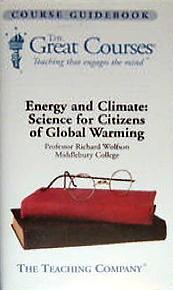
Energy and Climate: Science for Citizens in the Age of Global Warming [TTC Audio]
English | 1996 | 7 hrs and 40 mins | MP3 | 158 MB
Richard Wolfson
Middlebury College
Ph.D., Dartmouth College
Richard Wolfson is the Benjamin F. Wissler Professor of Physics at Middlebury College, where he has taught for over 25 years. He did undergraduate work at the Massachusetts Institute of Technology and Swarthmore College, graduating from Swarthmore with a double major in physics and philosophy. He holds a Master s degree in environmental studies from the University of Michigan and a Ph.D. in physics from Dartmouth College.
Professor Wolfson has spent sabbatical years as Visiting Scientist at the National Center for Atmospheric Research in Boulder, Colorado; at St. Andrews University in Scotland; and at Stanford University.
Professor Wolfson s research is published widely in scientific journals and includes such diverse fields as medical physics, plasma physics, solar energy engineering, electronic circuit design, observational astronomy, and theoretical astrophysics. He is the author of several books including an introductory physics textbook, Physics for Scientists and Engineers, currently in its third edition.
Professor Wolfson is also an interpreter of science for the non-specialist, a contributor to Scientific American, and author of the books Nuclear Choices: A Citizen s Guide to Nuclear Technology and Simply Einstein: Relativity Demystified.
Courses by this professor:
Einstein s Relativity and the Quantum Revolution: Modern Physics for Non-Scientists, 2nd Edition >
Energy and Climate: Science for Citizens in the Age of Global Warming >
Joy of Science/Einstein's Relativity and the Quantum Revolution (SET) >
Physics in Your Life >
Physics in Your Life/Einstein s Relativity and the Quantum Revolution (Set) >
General Information
=========
Title:
----
Energy And Climate; Science For Citizens In The Age Of Global Warming-
Author: The Teaching Company
Read By: Richard Wolfson
Genre: Lecture
Publisher: The Teaching Company
Abridged: No
Original Media Information
======
Media: Tape
Number: 5
Source: Downloaded
File Information
======
Number of MP3s: 10
Total Duration: 7:55:42
Total MP3 Size: 222.59
Parity Archive: No
Ripped By: Unknown
Encoded With: FhG
Encoded At:
---------
CBR 64 kbit/s 44100 Hz Mono; CBR 80 kbit/s 44100 Hz Mono
ID3 Tags: Set, v1.1, v2.3
Book Description
======
Energy and Climate: Science for Citizens in the Age of Global Warming-
(10 lectures, 45 minutes/lecture)
Course No. 154
Taught by Richard Wolfson
Middlebury College
Ph.D., Dartmouth College
Is global warming actually happening? Could it really threaten civilization?
How much money are we willing to spend on alternate fuels? Should we
use technologies that involve other risks (like nuclear power)?
Professor and physicist Richard Wolfson's course will allow you to form
answers to those questions answers that are grounded in scientific facts.
You do not need a background in science to understand these issues as
he presents them.
Using simple diagrams and graphics, Professor Wolfson makes his subject
both lively and accessible as he explains how the Earth's climate regulates
temperature, how human activity can unbalance this system, how scientists
predict the extent and impact of global warming, and what we can do
about it.
This course examines human energy use and global warming and offers
a basic literacy in the science of climate. Lectures cover:
how the Earth's climate regulates temperature
the basic sources of energy available on Earth
the alternatives to fossil fuels; the workings of nuclear fission and
fusion, and
some of the controversies surrounding nuclear energy.
Discover the Facts About Global Warming from an Award-Winning Physicist
Richard Wolfson is Benjamin F. Wissler Professor of Physics at Middlebury
College, where he has taught for more than 25 years. He has received
the Perkins Award for outstanding teaching at Middlebury and served
as chair of the physics department.
Author of numerous articles and books, Professor Wolfson is also a research
physicist. He has spent sabbatical years as Visiting Scientist at the
National Center for Atmospheric Research in Boulder, Colorado, and in
1993 was Visiting Scientist at St. Andrews University in Scotland.
He has crafted this 10-lecture series to examine human use of energy
and global warming, which he refers to as "one of the more controversial
environmental issues of recent decades."
"Concerns about the warming of Earth's climate have been with us for
some time. How serious is this concern? Recent newspaper headlines indicate
a real concern about the increasing global temperature," he continues.
What is actually happening?
Is the Earth undergoing a warming? If so, what are the consequences?
Are they dire?
Will the increasing temperatures cause the sea level to rise and inundate
coastal cities?
Will the warming render the world's major breadbaskets less productive?
Could the warming have beneficial effects?
What will be the economic consequences of global warming?
What costs would be involved in mitigating its effects?
Is global warming as serious as we originally thought, or has it been
exaggerated?
According to Dr. Wolfson, the purpose of this course is not to answer
all of these questions, or even the question of whether global warming
will occur, but to provide a basic literacy in the science of climate.
This improved literacy, he maintains, will allow us to examine more
effectively the issues involved and to gain better understanding of
why it is generally thought that global warming might occur and what
role human energy use plays in the problem.
Consider the Problem: What is the Greenhouse Effect?
In his opening presentation, Professor Wolfson attempts to provide the
scientific background necessary to understand how Earth's climate is
established. Major topics of discussion include:
Earth's energy balance
the greenhouse effect
greenhouse gas emissions
past climate changes, and
climate projections for the future.
The establishment of Earth's temperature became conducive to the existence
of life more than 3 billion years ago. By understanding how Earth's
climate was established, we are able to predict future climates and
the effect of global warming upon these climates.
Dr. Wolfson uses the warming of a house in winter as a model to demonstrate
the energy equation of energy input with energy loss. The Natural Greenhouse
Effect is discussed as the major factor in the discrepancy between the
mathematically determined temperature of Earth, which should be about
-18 C (0 Fahrenheit), and its actual temperature of 15 C or 59
F.
The absorption of outgoing infrared radiation by atmospheric water vapor
and CO2 causes the greenhouse effect, which warms Earth's atmosphere
by about 33 C.
In order to demonstrate the validity of the greenhouse effect on Earth,
we look at Venus and Mars as models. On Mars we see almost no greenhouse
effect, but on Venus we see the other extreme the "runaway greenhouse"
effect.
Mars and Venus both have temperatures that are warmer than they would
be without this effect. The natural carbon cycle on Earth is considered.
Although the presence of some CO2 in the atmosphere is desirable, the
increase is more than 30 percent since the beginning of the industrial
age.
"Unless some corrective measures are taken, it will double the preindustrial
level by the year 2100," says Professor Wolfson.
Looking into the past, Professor Wolfson describes the cyclic climate
changes that cause ice ages. He notes that the temperature difference
between now and an ice age is only about 10 F.
A Focus on Human Energy
Dr. Wolfson considers the use of computer models to predict future climate,
the limitations of these models, and their consistency in terms of broad
suggestions they make regarding future climates.
"The use of human energy is the dominant cause of the problem of global
warming as well as the enabling factor in many of the environmental
problems we face today," says Professor Wolfson.
"Problems like resource depletion and overpopulation are the consequence
in part of energy-intensive agriculture, pollution, and other environmental
problems. We have at our disposal a tremendous amount of energy much
more than our bodies alone can produce. This available energy and the
patterns of its use by human beings affect the terrestrial environment,
the atmosphere, and the climate."
The human use of energy, particularly in the industrialized world, is
a major topic of consideration in this series.
You will learn about statistics on energy use and global energy issues,
and examine the composition and measurement of energy, nuclear and renewable
energy alternatives, the continued use of our present dominant energy
source (which is the burning of fossil fuels), and possible means of
mitigating the negative impact of energy use upon our atmosphere. What
are the prospects for more efficient use of energy?
What Can Be Done?
There is potential for considerable energy savings both by individuals
and industry. Dr. Wolfson reviews trends in energy consumption and reduction
and discusses some of the possibilities for increased efficiency He
presents scenarios prepared by the American Council for an Energy Efficient
Economy (ACEEE) for specific reductions in energy.
"If we gain an appropriate level of scientific literacy and an understanding
of the relationship between issues of human energy consumption patterns
and global warming, we will be better able to make responsible decisions
in our individual, business, and political lives regarding the issues
of global warming," says Professor Wolfson.
Finally, Professor Wolfson suggests ways our energy use could be more
efficient. But do we have the will to make the necessary changes, or
will we be forced to adapt to the uncertainties of human-caused climate
change?
Course Lecture Titles
Keeping Warm
A Tale of Three Planets
Climates Past, Climates Future
Computing the Climate
Energy Cheap and Plentiful
Energy What It Does, Where It's From
Fossil Fuels
Nuclear Options
Renewable Energy
Energy Efficiency More from Less
Code:
https://nitroflare.com/view/921F32B3B4DE5B3/Energy_and_Climate_-_Science_for_Citizens_in_the_Age_of_Global_Warming.rar
Code:
https://rapidgator.net/file/90aa3b24cd2d002f502b73eb7142f373/Energy_and_Climate_-_Science_for_Citizens_in_the_Age_of_Global_Warming.rar.html
OP
Member
LEVEL 5
70 XP
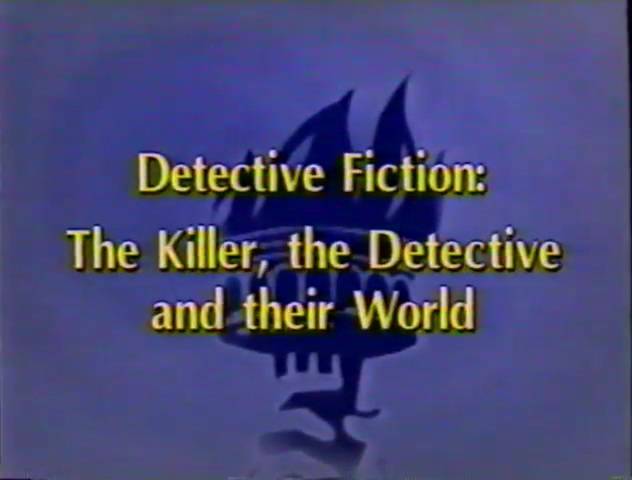
Detective Fiction: The Killer, The Detective, and Their World [TTC Audio]
English | 1993 | 5 hrs and 44 mins | MP3 | 158 MB
Professor Dennis Huston presents this series of lectures on detective fiction exploring the different ways in which mystery writers present the eternal conflict between pursued and pursuer.
General Information
=========
Title:
----
Detective Fiction: The Killer, The Detective, and Their World
Author: The Teaching Company
Read By: J. Dennis Huston
Genre: Lecture
Publisher: The Teaching Company
Abridged: No
Original Media Information
======
Media: Tape
Number: 4
Source: Downloaded
File Information
======
Number of MP3s: 8
Total Duration: 5:44:05
Total MP3 Size: 157.61
Parity Archive: No
Ripped By: jonboy
Encoded With: LAME 3.92
Encoded At: CBR 64 kbit/s 44100 Hz Mono
ID3 Tags: Set, v1.1, v2.3
Book Description
======
((Now Out Of Print)
Dectective Fiction: The Killer, The Detective, and Their World
by J. Dennis Huston
Rice University
Lecture 1: The English Detective Novel: Its Crimes and Conventions
Lecture 2: Agatha Christie: The Art of Ratiocination and Misdirection-
Lecture 3: Agatha Christie: The Limits of the Form
Lecture 4: The Killer and the Detective: Uneasy Distinctions
Lecture 5: The American Detective Novel: A Walk Down Mean Streets
Lecture 6: Dashiell Hammett: The Morally Ambiguous Hero in a Morally
Corrupt World
Lecture 7: Raymond Chandler: The Knight in the Perilous City
Lecture 8: The Serial Killer: Madness and Mayhem
Code:
https://nitroflare.com/view/43297F8C8433DDA/Detective_Fiction.rar
Code:
https://rapidgator.net/file/beece78a325229c29e19aa503254fda6/Detective_Fiction.rar.html
OP
Member
LEVEL 5
70 XP
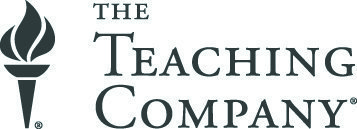
Ethics and Public Policy [TTC Audio]
English | 1991 | 5 hrs and 28 mins | MP3 | 225 MB
Authors: Edward Beiser, Teaching Company
Lecture 1. The nature of rights : competing conceptions
Lecture 2. On liberty : political censorship
Lecture 4. On liberty : censoring the offensive
Lecture 5. On liberty : are medical issues special?
Lecture 6. Racial equality : the American dilemma
Lecture 7. Are all persons created equal? : the matter of gender
Lecture 8. Conscience!
Code:
https://nitroflare.com/view/84AEE6108715C05/Ethics_and_Public_Policy.rar
Code:
https://rapidgator.net/file/08c6bace5e3dc806f424eee3bb32f177/Ethics_and_Public_Policy.rar.html
OP
Member
LEVEL 5
70 XP
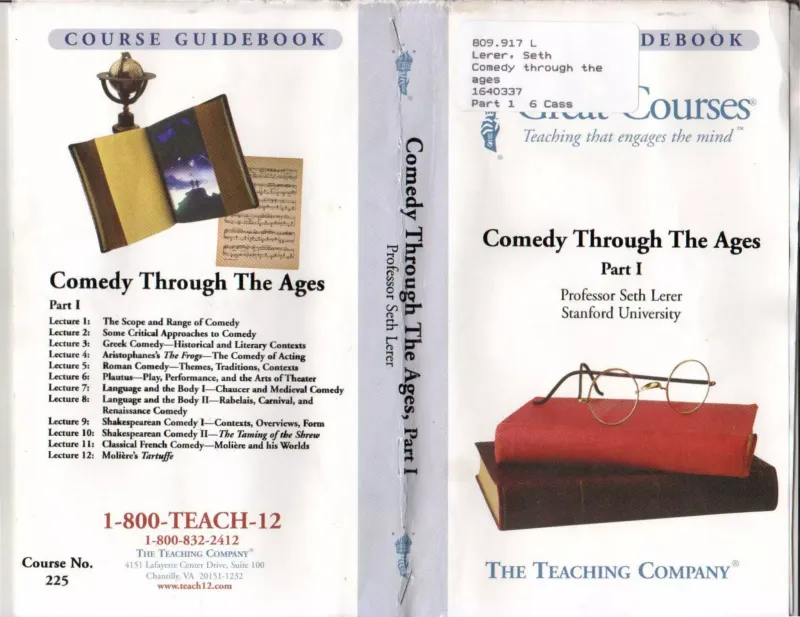
Comedy Through the Ages [TTC Audio]
English | 2000 | 12 hrs and 16 mins | MP3 | 365 MB
Authors: Seth Lerer, Teaching Company
Summary: Twenty four 30 min. lectures examine the meaning and history of comedy as a literary genre.
Part 1, Tape 1. Lecture 1. The scope and range of comedy ; Lecture 2. Some critical approaches to comedy ; Lecture 3. Greek comedy: historical and literary contexts ; Lecture 4. Aristophanes's The frogs: the comedy of acting
Tape 2. Lecture 5. Roman comedy: themes, traditions, contexts ; Lecture 6. Plautus: play, performance, and the arts of theater ; Lecture 7. Language and the body I: Chaucer and medieval comedy ; Lecture 8. Language and the body II: Rabelais, carnival, and renaissance comedy
Tape 3. Lecture 9. Shakespearean comedy I: contexts, overviews, form ; Lecture 10. Shakespearean comedy II: The taming of the shrew ; Lecture 11. Classic French comedy: Molie re and his worlds ; Lecture 12. Molie re's Tartuffe. Part 2, Tape 1. Lecture 13. The 18th century comedy of words ; Lecture 14. Sheridan's The rivals ; Lecture 15. Wilde and Coward I: comedies of class, aestheticism, and camp ; Lecture 16. Wilde and Coward II: the ends of new comedy
Tape 2. Lecture 17. Rituals and rites in modern comedy ; Lecture 18. Camp: history, criticism, comic texture ; Lecture 19. Women in comedy I ; Lecture 20. Women in comedy II: Anita Loos and the female comic voice
Tape 3. Lecture 21. Beckett: comedy and the absurd ; Lecture 22. Waiting for Godot: The landscape of comic emptiness ; Lecture 23. Ethnicity and humor: from vaudeville to Philip Roth ; Lecture 24. The comic legacy: present and future
Code:
https://nitroflare.com/view/5DAA221F325EB10/Comedy_Through_the_Ages.rar
Code:
https://rapidgator.net/file/5057a93f96af6b77d524037882e84eb7/Comedy_Through_the_Ages.rar.html
OP
Member
LEVEL 5
70 XP
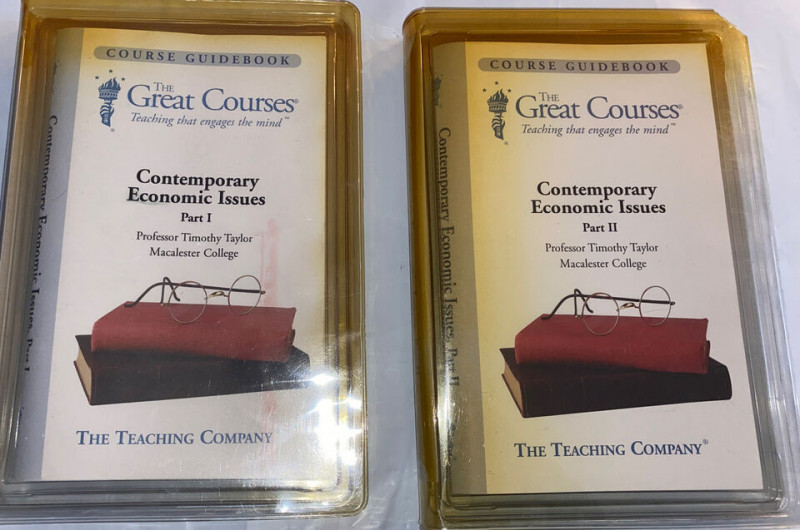
Contemporary Economic Issues [TTC Audio]
English | 2004 | 23 hrs and 45 mins | MP3 | 653 MB
Contemporary Economic Issues
Course Number 570 48 lectures (30 minutes/lecture)
Taught by: Professor Timothy Taylor Macalester College
"Economics was definitely NOT my field. But Professor Taylor is so good, so lucid, so focused, so cheerful, that he has captured my interest."
Cecile Farhen, The Bronx, NY
"This is an excellent course, easy to understand and perfect to listen to while driving."
Uwe D. Soenksen, Fletcher, NC
"Dow Plunges, With More Volatility Expected Amid Investor Worries"... "Fed Nudges Interest Rates Up to Calm Global Markets"...
"Congress Weighs Relief on Medicare Cuts"...
"Brazil, IMF Discuss Loan Package"...
You run across stories like these in the media every day as you try to keep track of the economic issues that profoundly affect you as an investor, a worker, or a taxpaying citizen.
You know you can t afford not to be informed on these questions, but just keeping up with the news is a struggle, and the jargon that journalists and experts sometimes use can perplex even the brightest layperson.
Wouldn t it be wonderful to have a stock of knowledge and analytical tools that you could apply to what you read and see, getting to the vital essence of economic debate and reportage with the swift comprehension that you need?
Professor Timothy Taylor s course on Contemporary Economic Issues can give you that knowledge and analytical acumen. Whether it s the shifting stock market, changes in the tax code, the size and shape of the post-Cold War "peace dividend," or vigorously contested subjects like health-care reform, immigration, foreign aid, deregulation, international-trade policy, and welfare programs, Professor Taylor offers clear and balanced explanations of what economics can teach you.
Grasp the Issues That Shape
Your World
Clearly, economics is a huge force in your life, but you won t need any special background to get the most out of this course. With Professor Taylor s knack for clearly communicating ideas and skillfully choosing examples, you ll learn to go "behind the headlines" with a deeper and more systematic understanding built on the knowledge you ll gain.
But what if you do have some formal training in economics and some considered views on the issues discussed? You may find that these lectures confirm and reinforce some of your opinions, while challenging you to rethink others. Then too, you may find yourself arriving at informed opinions on new subjects, while on still others you may conclude that suspending judgment is the wisest course, but even then you ll be in a better position to evaluate fresh evidence or arguments.
Whatever you conclude about the subjects that Professor Taylor explores, you can rest assured that your opinion will be the product of fresh thought fueled by this engaging and superbly taught lecture series. Look through the lecture descriptions and see if your interest isn t piqued. If you save and invest, work at a job or profession, and pay taxes, it certainly should be. Contemporary Economic Issues offers a wealth of important information that you won t find so readily available anywhere else. It s a superb investment for anyone who wants to be better informed.
Professor Taylor taught previously at Stanford, where his lecturing ability earned him the student association s Award for Excellence in Teaching. He also serves as managing editor of the Journal of Economic Perspectives, a leading review of new scholarship and ideas in his field. Customers who have purchased Economics, another Great Course that Professor Taylor has done for The Teaching Company, describe him as "fantastic," "informative and thoroughly enjoyable," and "most enlightening!"
Contemporary Economic Issues offers you an opportunity to discover what these customers were so excited about, and permanently takes the mystery out of a discipline whose insights and arguments stretch far beyond the classroom to crucially affect your life and future.
"This course is for everyone who wants to understand the headlines and make informed decisions about political promises concerning the economy."
Elaine Covington
Yorktown, VA
"My commute is made pleasant by your tapes. Tim Taylor is the best lecturer I ve ever experienced. I have all four of his courses and look forward to buying more."
Steve Penhall,
Cortez, CO
"Very organized, clear and concise with just the right touch of humor. Taylor presents the material in a way that makes it relevant and understandable I really enjoyed his style of lecturing."
Kathryn Simpson,
Portland, OR
Available on Audio CD and Audiotape
This course is available on audio CD and audiotape only.
Part I
Lecture 1: Economizing, the Economy, Economics, and Economic Policy
Lecture 2: America s Competition Policy Antitrust and Mergers
Lecture 3: The Great Deregulation Experiment Airlines and More
Lecture 4: Frontiers of Deregulation Telephones and Electricity
Lecture 5: Financing the Health Care Industry
Lecture 6: Competitiveness in Banks and Savings and Loans
Lecture 7: Re-Inventing Regulation
Lecture 8: Issues in Environmental Regulation
Lecture 9: Privatization Steering, not Rowing
Lecture 10: Medicine for Unemployment What Works, What Doesn t
Lecture 11: Are America s Jobs Decreasing in Quality?
Lecture 12: The Growing Inequality of Wages
Part II
Lecture 13: The Rise and Fall (and Rise?) of American Unions
Lecture 14: Discrimination Against Women and Minorities in the Labor Market
Lecture 15: Taking the Economics out of Immigration
Lecture 16: Welfare Reform
Lecture 17: Raising Wages for the Working Poor Minimum Wages, Wage Subsidies, and Job Training
Lecture 18: The Race for Global Economic Leadership
Lecture 19: Can We Increase U.S. Savings and Investment?
Lecture 20: Reform of K-12 Education
Lecture 21: The Delicacies of Investing in Infrastructure
Lecture 22: Technology, Research and Development
Lecture 23: Is the Stock Market Headed for a Crash?
Lecture 24: The Supply-Side Economics Movement
Part III
Lecture 25: Sectoral Evolution Farming, Manufacturing, Services, the Information Age?
Lecture 26: Federal Budgets Deficit, Balance, or Surplus
Lecture 27: The Shaky Foundations of Social Security
Lecture 28: Defense Spending and the Uncertainties of the "Peace Dividend"
Lecture 29: The Government in Health Care Medicare and Medicaid
Lecture 30: The American Tax Burden in Perspective
Lecture 31: Flat and Flatter Taxes
Lecture 32: Inflation Why the Measure Matters
Lecture 33: The Federal Reserve and Inflation Fighting
Lecture 34: Economic Interpretations of Federalism What Should States Do?
Lecture 35: Foreign Trade What s Really at Issue?
Lecture 36: Free Trade vs. Labor and Environmental Standards
Part IV
Lecture 37: The Trade Deficit What Are the Real Issues?
Lecture 38: Can Anything Be Done About International Financial Crashes?
Lecture 39: A Single European Currency
Lecture 40: The Economics of European Union
Lecture 41: From Communism to a State of Transition in Russia and Eastern Europe
Lecture 42: Has Japan s Economic Miracle Come and Gone?
Lecture 43: Lessons from the East Asian (Rumpled) Tigers
Lecture 44: China s Economic Surge
Lecture 45: India
Lecture 46: Market Economics Comes to Latin America
Lecture 47: Africa s Plight
Lecture 48: What Economists Know, and Don t Know, About Economic Policy
Code:
https://nitroflare.com/view/9B6FCCC94E9460D/Contemporary_Economic_Issues.rar
Code:
https://rapidgator.net/file/1b8389bddc97402f37e235500d0a6a92/Contemporary_Economic_Issues.rar.html
OP
Member
LEVEL 5
70 XP
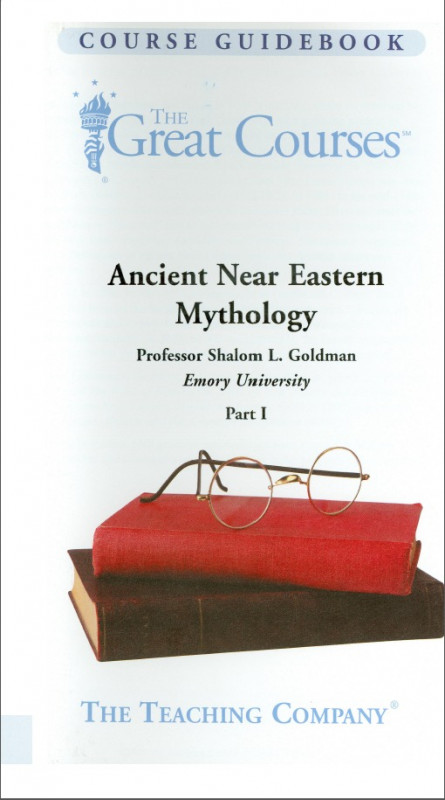
Ancient Near Eastern Mythology [TTC Audio]
English | 2000 | 12 hrs and 6 mins | MP3 | 333 MB
------------------------------------------------------
Title
------------------------------------------------------
Ancient Near Eastern Mythology
------------------------------------------------------
General Information
------------------------------------------------------
Author: The Teaching Company
Course Number: 2917 24
Lectures: 24 (30 minutes/lecture)
Taught by: Professor Shalom L. Goldman Emory University
------------------------------------------------------
MP3 Information
------------------------------------------------------
Encoding Bitrate: 64kbps, 22kHz
Mono/Stereo: Stereo
ID#3 Tags: Yes
Source: CD
------------------------------------------------------
Posting Plan
------------------------------------------------------
Highspeed: "alt.binaries.mp3.audiobooks.highspeed" over 1 day
Lowspeed: "alt.binaries.sounds.mp3.spoken-word" over 4 days
Repost: As Requested
Fills: As Requested
------------------------------------------------------
Lectures
------------------------------------------------------
Part I
Lecture 1: Studying Ancient Near Eastern Myth
Lecture 2: The Emergence of Civilization in the Near East
Lecture 3: Hittites and Canaanites
Lecture 4: Archaeology, Science, and Ideology
Lecture 5: Principles of Writing Systems
Lecture 6: Literary and Religious Aspects of Myth
Lecture 7: Ancient Near Eastern Myths and the Bible
Lecture 8: The Ancient Gods Egypt and Mesopotamia
Lecture 9: The Ancient Gods Syria/Canaan
Lecture 10: The Creation Myths of Egypt and Mesopotamia
Lecture 11: Epics of the Gods Syria/Canaan
Lecture 12: The Epic of Gilgamesh, Part One
Part II
Lecture 13: The Epic of Gilgamesh, Part Two
Lecture 14: Myths of Death and Destruction, Part One
Lecture 15: Myths of Death and Destruction, Part Two
Lecture 16: The Individual and Society Legal Texts
Lecture 17: The Individual and Society Myth and Legend
Lecture 18: Love, Lust, and Poetry
Lecture 19: Marriage, Divorce, and Other Arrangements
Lecture 20: Kingship and the Gods
Lecture 21: Royal Historians, Poets, and Artists Mesopotamia
Lecture 22: A Royal Couple Myth and Reality
Lecture 23: Royal Historians, Poets, and Artists Egypt
Lecture 24: Wisdom Literature; Conclusions
------------------------------------------------------
Course Description
------------------------------------------------------
In a time seemingly more devoted to practical realities with each passing
year, why would we want to study myths? What can the fables of ancient
civilizations long since gone to dust tell us about the world we must deal
with today, where each morning plunges many of us anew into a frenzied
pace of professional tasks, madcap scheduling, and day-to-day concerns on
a scale those ancients never could have imagined, leaving us precious little
time to ponder the deeper questions about life itself and our place in the
world?
The answer is that the ancients did imagine such things or at least their world s
version of them along with the same deep questions we ourselves yearn to solve.
And we are connected to them in more ways than we ourselves might ever imagine.
They looked out upon their crops and wondered if the lands on which their lives
depended would continue to be fruitful. And they looked toward the skies or across
the oceans or even, in their mind s eye, into the darkness of the underworld and
wondered if the gods who ruled them were displeased, and how to placate them if
they were. And they wondered why, despite all of their efforts, misfortune still fell
upon them, and what this portended about the fate of humanity itself.
And in their myths, which contemporary scholars are still wresting from the past,
they gave us their answers the ways they thought they should live and die, the
rules of love and marriage, how to raise their children, the rituals of worship, and the
relationship they would have to their gods.
These are, of course, the same answers those of us in modern times spend our own
lives trying to find. So in looking at the ancients mythology from a variety of
different perspectives, we can learn an extraordinary amount about not only their
world and how they viewed it, but about ourselves as well. And we also gain the
benefit of experiencing the pleasures of literature in reading these very first stories
humanity s oldest from the cradle of civilization.
Provocative Parallels With the Old Testament
Ancient Near Eastern Mythology opens a remarkably clear window into that
ancient world, made all the more inviting because of the provocative parallels the
region s mythology shares with the Hebrew Bible/Old Testament, and the opportunity
those parallels provide for us to gain new perspectives on the wellsprings of the
religious heritage shared by so many.
In exploring the mythology of this vital region which encompasses both Egypt and
Mesopotamia, the superpowers of the time, and the Hittite and Canaanite cultures
that lay between them scholars of myth must confront the problems imposed by
the lack of any central source of ancient myth.
They have had to painstakingly gather what they know from many genres, including
poetry; religious ritual; administrative documents such as king lists that might
claim the reign of an actual historical ruler to be hundreds of years, thus revealing
embedded mythic material; and archeological finds, from pottery to ancient texts.
And though many approaches have been taken to the study of myth, your
professor whose experience with the subject matter is itself multidisciplinary,
including a foray into opera with famous American composer Philip Glass lets you
experience them from four different thematic perspectives:
Myth as ancient science, functioning as a way for the ancients to explain
things: the origins of the earth; the creation of human beings; the social
order of the times and the need for kings to stay in power; the great
questions of human life such as issues about death or suffering...
Myth as a refraction or reflection of history, so that in reading the tales of the
gods we are really gaining an understanding of the dynamics of royal
families...
Myth as connected to ritual, an approach that links religious practice and
sacred narrative, so that we see how people of the time expressed their ideas
about the divine and about the world, and especially how to achieve and
maintain the cosmic harmony that was essential to life not being disrupted;
and...
Myth as embodying psychological and spiritual truths, with the commonality
that is borne out by the appearance of universal themes in all mythologies
telling us something about human psychology.
A Wealth of Insight From a Treasure Trove of Material
Professor Goldman s approach to the material is as intimate as it is knowledgeable
sharing, rather than lecturing about, a remarkably varied assortment of poems,
stories, anecdotes, and insights, including:
The controversy over whether finding common threads between ancient
myths and the Hebrew Bible/Old Testament such as the story of the flood
from The Epic of Gilgamesh and the story of Noah, or the episodes of the
infant set afloat in a reed basket in both the autobiographical The Sargon
Legend and the story of Moses supports or undermines religion, as well as
the strategy of famed British archaeologist Leonard Woolley, who used this
very controversy to ensure funding for his research;
The cycle of death and rebirth as carried out by the Egyptian pharaohs, in
whom are embodied, in life and death, respectively, Horus, god of kingship,
and Osiris, god of the dead;
The chilling passions of the goddess Anath, who was sister/consort to the
Canaanite deity, Baal, and whose joy in bloodshed and war literally bathing
in blood personified for the people of Ugarit (an ancient city and kingdom in
what is now Syria), and the other peoples of the ancient Near East, the fear
of war and the idea that war, once begun, is soon beyond anyone s control;
The intense romantic passion of the original Song of Solomon, and how it
differs from the Song of Songs that appears in so many church Bibles;
Some intriguing and unexpected highlights from the Code of Hammurabi the
laws promulgated by the Babylonian king of the 18th century B.C. including
a major difference in the way in which Egyptian and Mesopotamian society
differed with respect to both marriage and adultery;
The story of Enmerkar and the Land of Aratta, which includes mythic
elements, a recognition of the need for statecraft, and also a wonderful detail
that gives insight into Sumerian ideas about the mythic origins of writing,
which made their civilization possible;
Vivid sections from The Adoration of Inanna of Ur, one of the great poems of
the ancient Near East. Attributed to Enheduanna (who was appointed by her
father, Sargon, as priestess of Sin, the moon goddess), the poem was, along
with The Sargon Legend, a rare instance of two surviving documents from the
same family, and gives us information about the place of women in the rituals
of ancient Near East culture; and
The amazing tale of Akhenaten and Nefertiti whose 10-year reign in
Akhetaten inspired an unfinished revolution in Egyptian religion and art
including the discovery of the Amarna letters, a treasure trove of diplomatic
correspondence that revealed a surprising sense of internationalism and
pragmatism by the Egyptians.
In these and other glimpses of a mist-shrouded world, Ancient Near Eastern
Mythology sharpens our view of our own world.
About the professor:
Shalom L. Goldman (Ph.D., New York University, 1986) is Associate Professor of Hebrew and Middle Eastern Studies at Emory University, where he teaches both graduate and undergraduate courses in Middle Eastern Studies and conducts a graduate seminar in the Comparative Literature program. He has received awards for distinguished undergraduate teaching at both Emory and Dartmouth where he taught from 1988 to 1996 before joining the Emory faculty and was recognized in 2002 by the Emory chapter of Phi Beta Kappa for his contribution to excellence in undergraduate education. In the mid-1980s, he worked with American composer Philip Glass to create the opera Akhnaten. The opera is organized around a famous set of ancient Near Eastern texts, the Amarna letters and inscriptions. Professor Goldman is the editor of Hebrew and the Bible in America (1993) and the author of The Wiles of Women/The Wiles of Men: Joseph and Potiphar s Wife in Ancient Near Eastern, Jewish and Islamic Folklore (1995) and God s Sacred Tongue: Hebrew and the American
Code:
https://nitroflare.com/view/97CAAB7659C86F1/Ancient_Near_Eastern_Mythology.rar
Code:
https://rapidgator.net/file/9c4b7ffd8dd3e13d29d71044cf52887c/Ancient_Near_Eastern_Mythology.rar.html
OP
Member
LEVEL 5
70 XP
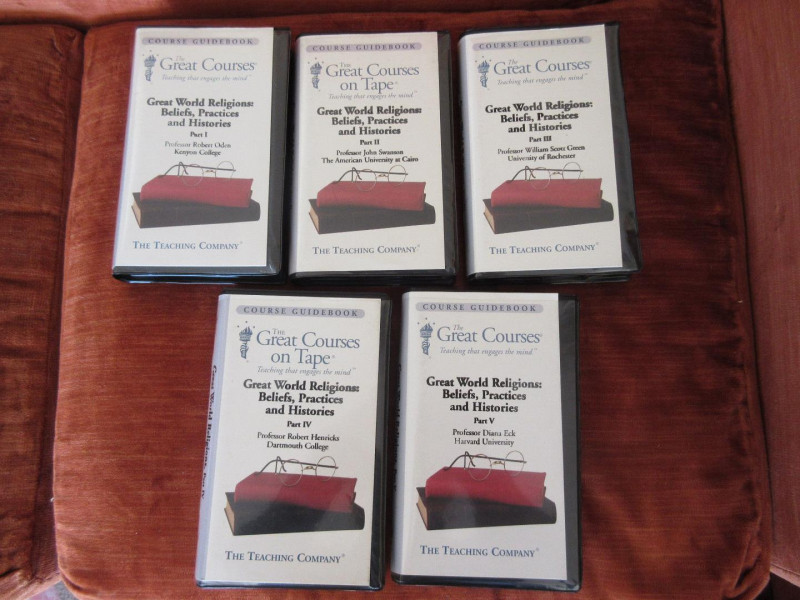
Great World Religions: Beliefs, Practices, and Histories [TTC Audio]
English | 1994 | 7 hrs and 33 mins | MP3 | 104 MB
Robert Oden, Ph.D.
From 1975 to 1989, Dr. Oden was a Professor of Religion at Dartmouth College,
where he received Dartmouth's first Distinguished Teaching Award.
He was a pioneered in the study of Religious fundamentalism.
Christian Religions and Religious Fundamentalism
L01.10 - (TTC) Intro & The Study of Religion
L02.10 - Hellenistic World & the 1st Christian Community
L03.10 - Jesus & the Gospel Tradition
L04.10 - The Growth of the Early Christian Community
L05.10 - Eastern Orthodox Christianity
L06.10 - Reformed Christianity & the Revivalist Tradition
L07.10 - The Origins of Christian Fundamentalism
L08.10 - Fundam. in America Before & After the Scopes Trial
L09.10 - The New Religion of the Right the Millennial Extreme...
L10.10 - Explaining Religion's Differences & Similarities
Code:
https://nitroflare.com/view/9DFCFC864E387C6/Christian_Religions_and_Religious_Fundamentalism.rar
Code:
https://rapidgator.net/file/ecd590048e5a3cfc8dd8ccc491448ae1/Christian_Religions_and_Religious_Fundamentalism.rar.html
OP
Member
LEVEL 5
70 XP

American Military Experience [TTC Audio]
English | 1991 | 5 hrs and 36 mins | MP3 | 308 MB
Professor Robert E. Morris
01-08 - Clausewitz and the Theory of War
02-08 - Priciples of War
03-08 - World War I
04-08 - World War II Opening Campaigns
05-08 - World War II Allied Strategy in the European Theater
06-08 - World War II War in the Pacific
07-08 - Vietnam Historical Overview
08-08 - Vietnam Analysis
Code:
https://nitroflare.com/view/9A45EB55A00990B/American_Military_Experience.rar
Code:
https://rapidgator.net/file/5657fcaf76c140e07a2a98d34c01cfb2/American_Military_Experience.rar.html